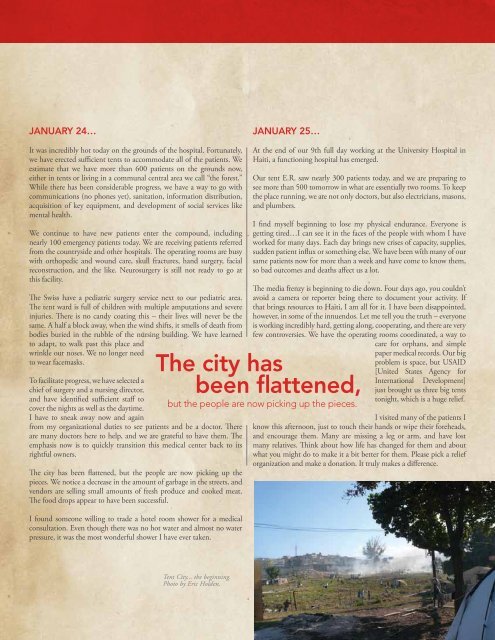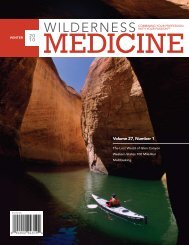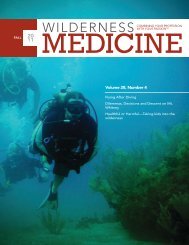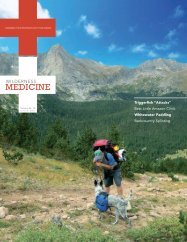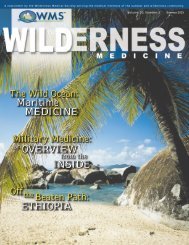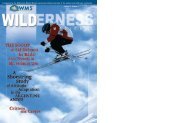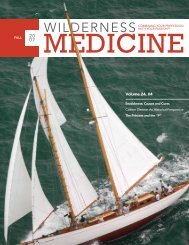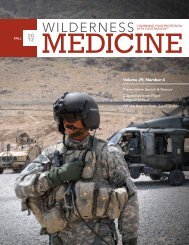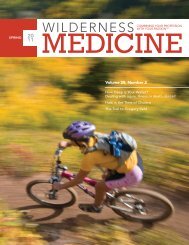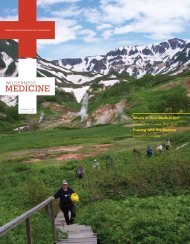Volume 27, Number 2 - Wilderness Medical Society
Volume 27, Number 2 - Wilderness Medical Society
Volume 27, Number 2 - Wilderness Medical Society
Create successful ePaper yourself
Turn your PDF publications into a flip-book with our unique Google optimized e-Paper software.
January 24…<br />
January 25…<br />
It was incredibly hot today on the grounds of the hospital. Fortunately,<br />
we have erected sufficient tents to accommodate all of the patients. We<br />
estimate that we have more than 600 patients on the grounds now,<br />
either in tents or living in a communal central area we call “the forest.”<br />
While there has been considerable progress, we have a way to go with<br />
communications (no phones yet), sanitation, information distribution,<br />
acquisition of key equipment, and development of social services like<br />
mental health.<br />
We continue to have new patients enter the compound, including<br />
nearly 100 emergency patients today. We are receiving patients referred<br />
from the countryside and other hospitals. The operating rooms are busy<br />
with orthopedic and wound care, skull fractures, hand surgery, facial<br />
reconstruction, and the like. Neurosurgery is still not ready to go at<br />
this facility.<br />
The Swiss have a pediatric surgery service next to our pediatric area.<br />
The tent ward is full of children with multiple amputations and severe<br />
injuries. There is no candy coating this – their lives will never be the<br />
same. A half a block away, when the wind shifts, it smells of death from<br />
bodies buried in the rubble of the nursing building. We have learned<br />
to adapt, to walk past this place and<br />
wrinkle our noses. We no longer need<br />
to wear facemasks.<br />
To facilitate progress, we have selected a<br />
chief of surgery and a nursing director,<br />
and have identified sufficient staff to<br />
cover the nights as well as the daytime.<br />
I have to sneak away now and again<br />
from my organizational duties to see patients and be a doctor. There<br />
are many doctors here to help, and we are grateful to have them. The<br />
emphasis now is to quickly transition this medical center back to its<br />
rightful owners.<br />
The city has been flattened, but the people are now picking up the<br />
pieces. We notice a decrease in the amount of garbage in the streets, and<br />
vendors are selling small amounts of fresh produce and cooked meat.<br />
The food drops appear to have been successful.<br />
I found someone willing to trade a hotel room shower for a medical<br />
consultation. Even though there was no hot water and almost no water<br />
pressure, it was the most wonderful shower I have ever taken.<br />
At the end of our 9th full day working at the University Hospital in<br />
Haiti, a functioning hospital has emerged.<br />
Our tent E.R. saw nearly 300 patients today, and we are preparing to<br />
see more than 500 tomorrow in what are essentially two rooms. To keep<br />
the place running, we are not only doctors, but also electricians, masons,<br />
and plumbers.<br />
I find myself beginning to lose my physical endurance. Everyone is<br />
getting tired…I can see it in the faces of the people with whom I have<br />
worked for many days. Each day brings new crises of capacity, supplies,<br />
sudden patient influx or something else. We have been with many of our<br />
same patients now for more than a week and have come to know them,<br />
so bad outcomes and deaths affect us a lot.<br />
The media frenzy is beginning to die down. Four days ago, you couldn’t<br />
avoid a camera or reporter being there to document your activity. If<br />
that brings resources to Haiti, I am all for it. I have been disappointed,<br />
however, in some of the innuendos. Let me tell you the truth – everyone<br />
is working incredibly hard, getting along, cooperating, and there are very<br />
few controversies. We have the operating rooms coordinated, a way to<br />
care for orphans, and simple<br />
paper medical records. Our big<br />
problem is space, but USAID<br />
[United States Agency for<br />
International Development]<br />
just brought us three big tents<br />
tonight, which is a huge relief.<br />
The city has<br />
been flattened,<br />
but the people are now picking up the pieces.<br />
I visited many of the patients I<br />
know this afternoon, just to touch their hands or wipe their foreheads,<br />
and encourage them. Many are missing a leg or arm, and have lost<br />
many relatives. Think about how life has changed for them and about<br />
what you might do to make it a bit better for them. Please pick a relief<br />
organization and make a donation. It truly makes a difference.<br />
Tent City... the beginning.<br />
Photo by Eric Holden.


